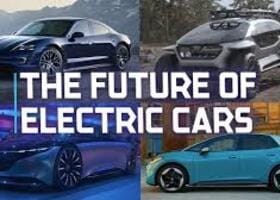Electric cars are poised to become a major force in the automotive industry as concerns over climate change and the desire for sustainable transportation grow. The future of electric cars is bright, with technological advancements leading to increased range, faster charging times, and more affordable prices.
The adoption of electric cars has opened doors for future brands. There are new possibilities and ways to enhance both the vehicles and therefore the systems related to it, the facility system, for instance. Electric vehicles are being considered because of the way forward for vehicles, whereas the smart grid appears to be the grid of the longer term.
Future Of Electric Cars
V2G is that the link between these two technologies and both are benefiting from it. With V2G comes other essential systems required for a sustainable electric vehicle scenario: charge scheduling, VPP, smart metering, etc. Future charging technologies need to improve a lot to form electric cars widely accepted.
charging time
The charging time has got to be decreased extensively for creating electric cars more flexible. Better new electric car batteries are a must to take electric car technology further. There’s a requirement for batteries that use non-toxic materials and have higher power density, less cost and weight, more capacity, and need less time to recharge.
technologies
Though technologies better than Li-ion are discovered already, they’re not being pursued industrially due to the large costs related to creating a working version. Besides, Li-ion technology has the potential to be improved a lot more. Li-air batteries might be an honest choice to increase the range of electric cars.
Electric vehicles are likely to move faraway from using static magnet motors that use rare-earth materials. Motors with internal static magnet may stay in use.
Wireless power transfer systems are likely to exchange the present cabled charging system. Concepts revealed by major automakers adopted this feature to spotlight their usefulness and convenience.


The Rolls-Royce 103EX and therefore the Vision Mercedes-Maybach 6 is often taken as examples for that. Electric roads for wireless charging of vehicles may appear also. Though this is often not still viable, things may change within the future.
Vehicles that follow a delegated route along the highway, like trucks, can get their power from
overhead lines like trains or trams. It’ll allow them to collect energy as long as their route resides
with the facility lines, then carry on with energy from on-board sources.
new solutions
One of the new solutions for electric vehicles is solid-state batteries, which offer higher energy density, faster charging times, and increased safety. Another development is wireless charging, which allows electric vehicles to be charged simply by parking over a charging pad.
New ways of recovering energy from the vehicle may appear. Goodyear has demonstrated a tire which will harvest energy from the warmth generated there using thermo-piezoelectric material. There also are chances of solar-powered vehicles. Until now, these haven’t appeared useful as installed solar cells only manage to convert up to 20% of the input power.
Much research goes on to form the electronics and sensors in electric cars more compact, rugged, and cheaper—which in many cases are resulting in advanced solid-state devices that will achieve these goals with promises of cheaper products if they can be mass-produced.
Some examples are often the works on:
-gas sensors
-smart LED drivers
-smart drivers for automotive alternators
-advanced gearboxes
-compact and
-smart power switches to weather harsh conditions
Future research topics will, of course, revolve around making electric cars technology more efficient, affordable, and convenient. More of such researches is probably going to travel on emphasizing on better battery technologies, ultracapacitors, fuel cells, flywheels, turbines, and other individual and hybrid configurations.
battery technology
Better charging technologies will remain an important research topic in near future. This is often one of the areas the electric car technology is lacking very badly. Wireless charging technologies are very likely to draw in more researchers’ attention.
Plenty of research has already been done incorporating electric cars. Are new challenges and possibilities that electric cars bring with them to the existing grid and also to the grid of the future.
With more implementation of smart grids, distributed generation, and renewable energy sources, researches in these fields are likely to increase.
Furthermore, there are new electric car models being introduced by major car manufacturers that are designed to be more affordable and accessible to a wider range of consumers. Governments around the world are also providing incentives and investing in infrastructure to support the growth of electric vehicles.
Overall, the future of electric cars looks promising as more people recognize the benefits of sustainable transportation and the automotive industry continues to innovate and improve electric vehicle technology.
